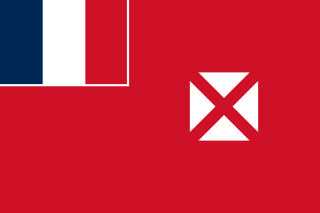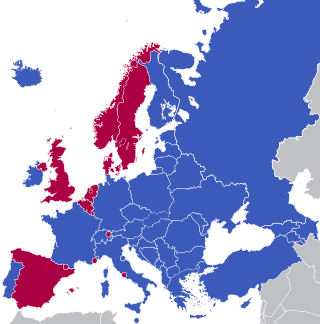
Wallis and Futuna, officially the Territory of the Wallis and Futuna Islands, is a French island collectivity in the South Pacific, situated between Tuvalu to the northwest, Fiji to the southwest, Tonga to the southeast, Samoa to the east, and Tokelau to the northeast.

The administrative divisions of France are concerned with the institutional and territorial organization of French territory. These territories are located in many parts of the world. There are many administrative divisions, which may have political, electoral (districts), or administrative objectives. All the inhabited territories are represented in the National Assembly, Senate and Economic and Social Council and their citizens have French citizenship and elect the President of France.
A territorial collectivity, or territorial authority, in many francophone countries, is a legal entity governed by public law that exercises within its territory certain powers devolved to it by the State as part of a decentralization process. In France, it also refers to a chartered administrative division of France with recognized governing authority. It is the generic name for any territory with an elective form of local government and local regulatory authority. The nature of a French territorial collectivity is set forth in Article 72 of the Constitution of France (1958), which provides for local autonomy within limits prescribed by law.

Politics of Wallis and Futuna takes place in a framework of a parliamentary representative democratic French overseas collectivity, whereby the President of the Territorial Assembly is the head of government, and of a multi-party system. Executive power is exercised by the government.
Petelo Vikena was Tuigaifo, or Monarch, of the Kingdom of Alo, which is also known as the Kingdom of Futuna from his coronation on November 6, 2008 to his abdication on January 22, 2010. Alo is one of the three traditional kingdoms, or chiefdoms, which comprise Wallis and Futuna.

Monarchism in France is the advocacy of restoring the monarchy in France, which was abolished after the 1870 defeat by Prussia, arguably before that in 1848 with the establishment of the French Second Republic. The French monarchist movements are roughly divided today in three groups:
- The Legitimists for the royal House of Bourbon,
- the Orléanists for the cadet branch of the House of Orléans, and
- the Bonapartists for the imperial House of Bonaparte

Overseas France consists of 13 French territories outside Europe, mostly the remnants of the French colonial empire that remained a part of the French state under various statuses after decolonisation. Most are part of the European Union.
Nivaleta Iloai was a politician from Wallis and Futuna. She served as the first female president of the Territorial Assembly of Wallis and Futuna from April 1 to December 11, 2013, as well as November 26, 2020 to March 25, 2022.
Prostitution in Overseas France varies from area to area with regard to extent, law enforcement and legality.

Elections for the Territorial Assembly of Wallis and Futuna were held on 20 March 2022 where all 20 seats were up for election.
The Second World War in Wallis and Futuna was a period of significant upheaval for this French protectorate territory in the Pacific.

'Aliki is a term in the Wallisian and Futunan Polynesian languages that refers to a category of people related to the chieftaincy of Wallis and Futuna and its members. In English, it is often translated as "noble" or "nobility," though this is an imperfect translation.

The customary kings of Wallis and Futuna are the leaders of the three traditional kingdoms of Uvea, Alo, and Sigave, which form part of the French overseas collectivity of Wallis and Futuna, located in Polynesia in the Pacific Ocean. Wallis and Futuna coexist with the Oceanian monarchies of Samoa and Tonga. The authority and powers of the customary kings are recognized by the 1961 statute of Wallis and Futuna, which thus constitutes the last three active monarchies recognized by the French state on French territory. Additionally, the customary kings receive financial compensation from the state.

The customary kingdoms of Wallis and Futuna are a special subdivision of the French overseas collectivity of Wallis and Futuna. Officially recognized in 1961 by the French state in the statute of Wallis-et-Futuna, they are governed by the customary kings of Wallis-et-Futuna. This is the only subdivision of France that is still a kingdom. There are three kingdoms: Uvea, on the island of Wallis, and the kingdoms of Sigave and Alo on the islands of Futuna and Alofi. These kingdoms differ in history, politics, language, and flag. The kingdoms are called pule'aga sau in Futunian, meaning “king's domain”.

The Protectorate of Wallis and Futuna was a French protectorate from March 5, 1888, to July 29, 1961, over the islands of Wallis, Futuna, and Alofi, in the Pacific Ocean. It was established at the request of the customary kings, under the influence of Catholic Marist missionaries who had converted the population in 1840-42 and sought French protection against the advance of Protestants in the region. In April 1887, the protectorate over Wallis was signed. It was extended to Futuna the following year, although these islands were administratively attached to New Caledonia until 1909. Given the islands' low strategic interest and remoteness, there was no real colonization.

The Royal Palace of Uvea is the seat of the Lavelua, the customary king of Uvea, on the island of Wallis. It is located in Mata-Utu, the capital of the overseas territory of Wallis and Futuna.









